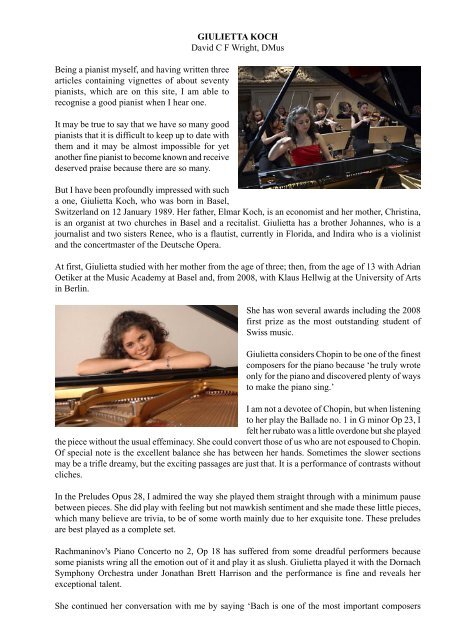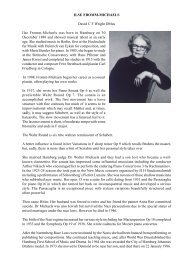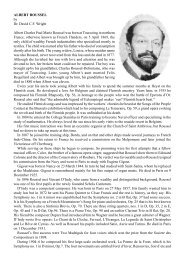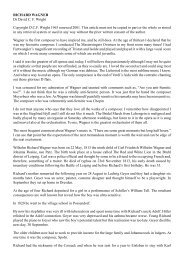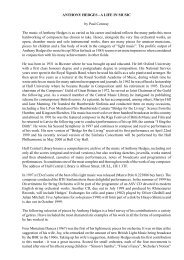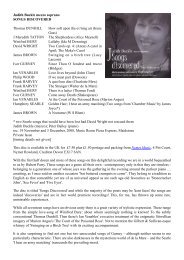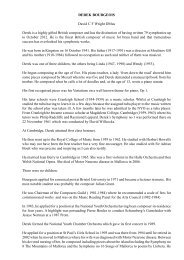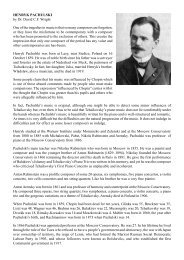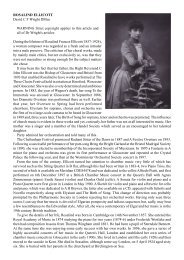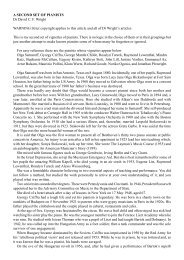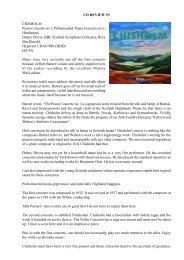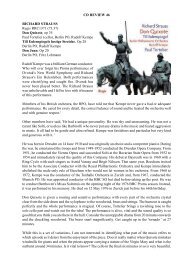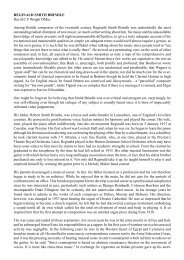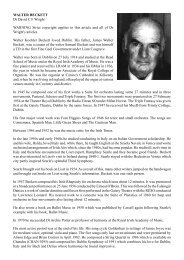You also want an ePaper? Increase the reach of your titles
YUMPU automatically turns print PDFs into web optimized ePapers that Google loves.
Being a pianist myself, and having written three<br />
articles containing vig<strong>net</strong>tes of about seventy<br />
pianists, which are on this site, I am able to<br />
recognise a good pianist when I hear one.<br />
It may be true to say that we have so many good<br />
pianists that it is difficult to keep up to date with<br />
them and it may be almost impossible for yet<br />
another fine pianist to become known and receive<br />
deserved praise because there are so many.<br />
GIULIETTA KOCH<br />
David C F Wright, DMus<br />
But I have been profoundly impressed with such<br />
a one, <strong>Giulietta</strong> <strong>Koch</strong>, who was born in Basel,<br />
Switzerland on 12 January 1989. Her father, Elmar <strong>Koch</strong>, is an economist and her mother, Christina,<br />
is an organist at two churches in Basel and a recitalist. <strong>Giulietta</strong> has a brother Johannes, who is a<br />
journalist and two sisters Renee, who is a flautist, currently in Florida, and Indira who is a violinist<br />
and the concertmaster of the Deutsche Opera.<br />
At first, <strong>Giulietta</strong> studied with her mother from the age of three; then, from the age of 13 with Adrian<br />
Oetiker at the Music Academy at Basel and, from 2008, with Klaus Hellwig at the University of Arts<br />
in Berlin.<br />
She has won several awards including the 2008<br />
first prize as the most outstanding student of<br />
Swiss music.<br />
<strong>Giulietta</strong> considers Chopin to be one of the finest<br />
composers for the piano because ‘he truly wrote<br />
only for the piano and discovered plenty of ways<br />
to make the piano sing.’<br />
I am not a devotee of Chopin, but when listening<br />
to her play the Ballade no. 1 in G minor Op 23, I<br />
felt her rubato was a little overdone but she played<br />
the piece without the usual effeminacy. She could convert those of us who are not espoused to Chopin.<br />
Of special note is the excellent balance she has between her hands. Sometimes the slower sections<br />
may be a trifle dreamy, but the exciting passages are just that. It is a performance of contrasts without<br />
cliches.<br />
In the Preludes Opus 28, I admired the way she played them straight through with a minimum pause<br />
between pieces. She did play with feeling but not mawkish sentiment and she made these little pieces,<br />
which many believe are trivia, to be of some worth mainly due to her exquisite tone. These preludes<br />
are best played as a complete set.<br />
Rachmaninov's Piano Concerto no 2, Op 18 has suffered from some dreadful performers because<br />
some pianists wring all the emotion out of it and play it as slush. <strong>Giulietta</strong> played it with the Dornach<br />
Symphony Orchestra under Jonathan Brett Harrison and the performance is fine and reveals her<br />
exceptional talent.<br />
She continued her conversation with me by saying ‘Bach is one of the most important composers
ecause he was the starting point for many and for those<br />
who came after him. I adore his polyphonic music and the<br />
way you can listen to his music in both a horizontal and<br />
vertical way’.'<br />
I asked her what her goal in music was.<br />
She answered, ‘It is good to achieve an ultimate goal, but<br />
even if I had one, I would not want to reach it because<br />
there is no end in sight to all the possibilities that music<br />
provides. It is an endless path and the goal is the path<br />
itself.’<br />
At the age of fourteen, she made her professional debut<br />
playing Mendlessohn's Capriccio brillante in Zurich with<br />
the Rundfunk Symphony Orchestra conducted by Michael<br />
Sanderling. She showed a splendid technique and fine<br />
musicianship even then.<br />
When it comes to the 'exposed' music of Mozart such as<br />
the Piano Concerto no 18 in B flat K546, we find in her<br />
playing a clarity, reliable finger-work, superb articulation<br />
and she fully captures the grace and elegance of Mozart. She played this in Brazil in 2008 with the<br />
Bahia Symphony Orchestra under Ricardo Castro. She has also worked on the sublime Piano Concerto<br />
no 20 in D minor K466 and performed it with the Norddeutsche Orchestra under Bernhard Klee in<br />
Rostock. She also captured the right style in Rossetti's Piano Concerto in G.<br />
This give rise to the fact of her versatility and that she is not going to be typecast. One thinks of one<br />
female pianist who seems to play nothing but Mozart and Schubert. <strong>Giulietta</strong> is first rate in the romantic<br />
works and in the classical works as well. However, she may not have captured the style of George<br />
Gershwin in his Rhapsody in Blue which she gave with Basel Symphony Orchestra under Howard<br />
Griffiths. One could say it was a highly personal performance but, to many, it may have lacked panache.<br />
The most rewarding performance for me was her playing of Beethoven's Piano Concerto no. 1 in C<br />
performed in Munich in November 2008 with Carlo Dominuez conducting. The finale was sensational<br />
exactly the right speed, rhythmically sound and very exciting. The music was joyful and, consequently,<br />
so was I.<br />
One problem for performers is that their performers are judged in the light of other performers.<br />
Comparisons can be odious and unfair. But I was moved by her performance of Debussy's the Girl<br />
with the Flaxen Hair. It was architecturaly sound.<br />
She formed a piano trio called the Rahn Trio in<br />
which the violinist is Maria Stabrawa and the<br />
cellist Julian Arp, now Norbert Anger. Included<br />
in their repertoire are works by Beethoven and<br />
Shostakovich. She has also played with the Regio<br />
Trio with Fabian Klasener and Isabel Gehweiler.<br />
She has a high regard for the pianist Lazar<br />
Berman who died in 2005 a few days short of his<br />
65th birthday. She seems at ease in the company<br />
of other musicians including Per Norgard whom
she met at the St Moritz Festival. He is a fascinating composer from Denmark who has written seven<br />
symphonies, ten string quartets, two violin concertos, two percussion concertos and concertos each<br />
for piano and viola and two for accordion. There are two harp concertos, a piano trio, a piano quintet,<br />
vocal and choral music including motets and four sonatas for solo cello.<br />
Her congenial disposition has included her performing Rachmaninov's Romance for piano six hands<br />
with Frank Laurent Grandpre and Alessandro Stelle.<br />
She is very well known in Switzerland and always receives standing ovations and is asked back for<br />
more concerts. She is becoming well known in Germany. She does not have an agent and, generally,<br />
concert promoters tend to engage the most well-known and established performers.<br />
I am very fussy about pianists but this young lady is someone I will watch with great interest.<br />
COPYRIGHT David C F Wright 2010. This article or any part of it, however small, must not be<br />
copied, quoted, reproduced, downloaded or altered in any way whatsoever nor stored in any<br />
retrieval system. Failure to comply is in breach of International Copyright Law and will render<br />
any offender liable to action at law.


